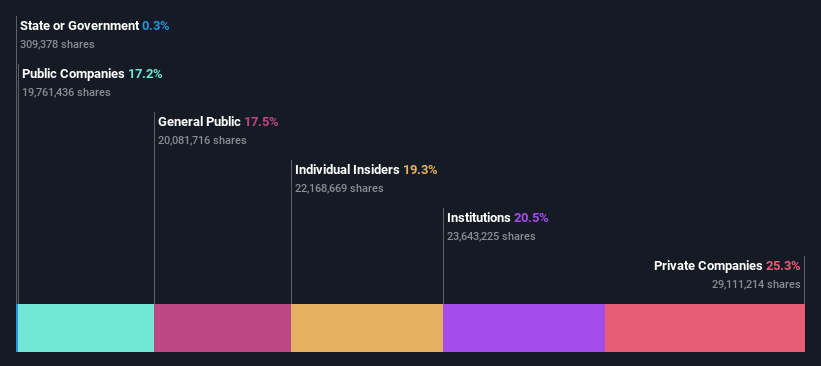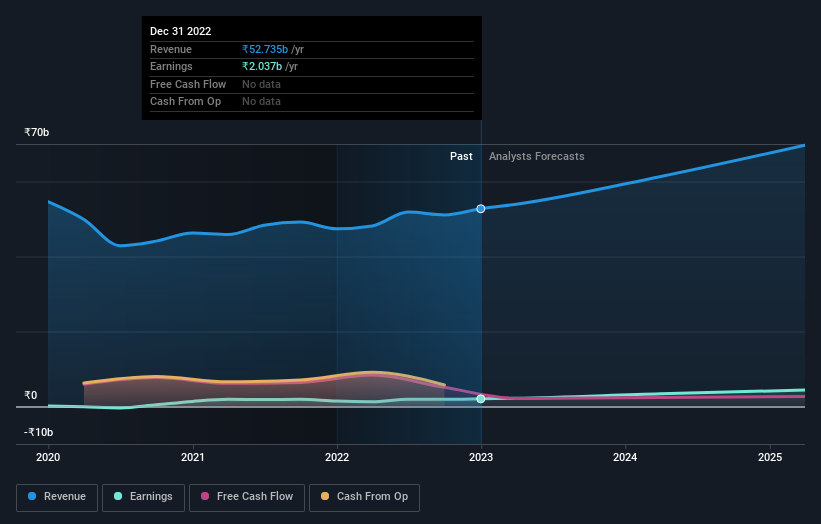- India
- /
- Consumer Durables
- /
- NSEI:BAJAJELEC
Institutions profited after Bajaj Electricals Limited's (NSE:BAJAJELEC) market cap rose ₹8.7b last week butprivate companies profited the most

Key Insights
- Significant control over Bajaj Electricals by private companies implies that the general public has more power to influence management and governance-related decisions
- The top 4 shareholders own 50% of the company
- Recent sales by insiders
To get a sense of who is truly in control of Bajaj Electricals Limited (NSE:BAJAJELEC), it is important to understand the ownership structure of the business. The group holding the most number of shares in the company, around 25% to be precise, is private companies. In other words, the group stands to gain the most (or lose the most) from their investment into the company.
While private companies were the group that benefitted the most from last week’s ₹8.7b market cap gain, institutions too had a 21% share in those profits.
Let's take a closer look to see what the different types of shareholders can tell us about Bajaj Electricals.
View our latest analysis for Bajaj Electricals

What Does The Institutional Ownership Tell Us About Bajaj Electricals?
Many institutions measure their performance against an index that approximates the local market. So they usually pay more attention to companies that are included in major indices.
Bajaj Electricals already has institutions on the share registry. Indeed, they own a respectable stake in the company. This can indicate that the company has a certain degree of credibility in the investment community. However, it is best to be wary of relying on the supposed validation that comes with institutional investors. They too, get it wrong sometimes. When multiple institutions own a stock, there's always a risk that they are in a 'crowded trade'. When such a trade goes wrong, multiple parties may compete to sell stock fast. This risk is higher in a company without a history of growth. You can see Bajaj Electricals' historic earnings and revenue below, but keep in mind there's always more to the story.

We note that hedge funds don't have a meaningful investment in Bajaj Electricals. Our data shows that Bajaj Sevashram Pvt. Ltd. is the largest shareholder with 20% of shares outstanding. Meanwhile, the second and third largest shareholders, hold 17% and 8.1%, of the shares outstanding, respectively. Shekharkumar Bajaj, who is the third-largest shareholder, also happens to hold the title of Chairman of the Board.
On looking further, we found that 50% of the shares are owned by the top 4 shareholders. In other words, these shareholders have a meaningful say in the decisions of the company.
While studying institutional ownership for a company can add value to your research, it is also a good practice to research analyst recommendations to get a deeper understand of a stock's expected performance. There are plenty of analysts covering the stock, so it might be worth seeing what they are forecasting, too.
Insider Ownership Of Bajaj Electricals
While the precise definition of an insider can be subjective, almost everyone considers board members to be insiders. Company management run the business, but the CEO will answer to the board, even if he or she is a member of it.
I generally consider insider ownership to be a good thing. However, on some occasions it makes it more difficult for other shareholders to hold the board accountable for decisions.
It seems insiders own a significant proportion of Bajaj Electricals Limited. It is very interesting to see that insiders have a meaningful ₹26b stake in this ₹135b business. Most would say this shows a good degree of alignment with shareholders, especially in a company of this size. You can click here to see if those insiders have been buying or selling.
General Public Ownership
With a 17% ownership, the general public, mostly comprising of individual investors, have some degree of sway over Bajaj Electricals. While this group can't necessarily call the shots, it can certainly have a real influence on how the company is run.
Private Company Ownership
We can see that Private Companies own 25%, of the shares on issue. It's hard to draw any conclusions from this fact alone, so its worth looking into who owns those private companies. Sometimes insiders or other related parties have an interest in shares in a public company through a separate private company.
Public Company Ownership
We can see that public companies hold 17% of the Bajaj Electricals shares on issue. This may be a strategic interest and the two companies may have related business interests. It could be that they have de-merged. This holding is probably worth investigating further.
Next Steps:
While it is well worth considering the different groups that own a company, there are other factors that are even more important.
I like to dive deeper into how a company has performed in the past. You can access this interactive graph of past earnings, revenue and cash flow, for free.
But ultimately it is the future, not the past, that will determine how well the owners of this business will do. Therefore we think it advisable to take a look at this free report showing whether analysts are predicting a brighter future.
NB: Figures in this article are calculated using data from the last twelve months, which refer to the 12-month period ending on the last date of the month the financial statement is dated. This may not be consistent with full year annual report figures.
If you're looking to trade Bajaj Electricals, open an account with the lowest-cost platform trusted by professionals, Interactive Brokers.
With clients in over 200 countries and territories, and access to 160 markets, IBKR lets you trade stocks, options, futures, forex, bonds and funds from a single integrated account.
Enjoy no hidden fees, no account minimums, and FX conversion rates as low as 0.03%, far better than what most brokers offer.
Sponsored ContentValuation is complex, but we're here to simplify it.
Discover if Bajaj Electricals might be undervalued or overvalued with our detailed analysis, featuring fair value estimates, potential risks, dividends, insider trades, and its financial condition.
Access Free AnalysisHave feedback on this article? Concerned about the content? Get in touch with us directly. Alternatively, email editorial-team (at) simplywallst.com.
This article by Simply Wall St is general in nature. We provide commentary based on historical data and analyst forecasts only using an unbiased methodology and our articles are not intended to be financial advice. It does not constitute a recommendation to buy or sell any stock, and does not take account of your objectives, or your financial situation. We aim to bring you long-term focused analysis driven by fundamental data. Note that our analysis may not factor in the latest price-sensitive company announcements or qualitative material. Simply Wall St has no position in any stocks mentioned.
About NSEI:BAJAJELEC
Bajaj Electricals
Engages in the consumer durables; and engineering, procurement, and construction businesses in India.
Excellent balance sheet with reasonable growth potential and pays a dividend.
Similar Companies
Market Insights
Community Narratives



